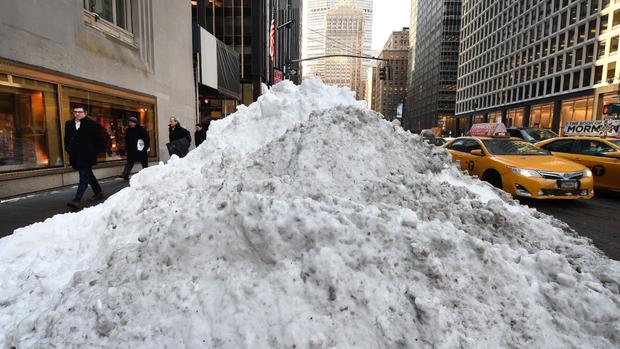After blizzard, snow shoveling linked to deadly heart attacks
Even though skies are clear again, health risks remain for East Coast residents still struggling to dig out from under the mountains of snow left by this weekend's blizzard.
At least 45 snowstorm-related deaths have been reported -- more than a dozen of them in people who suffered heart attacks while shoveling snow. At least 10 people died while shoveling in the New York City are, where the blizzard hit much harder than first expected. Most were over 60 years old. Shoveling-related heart attacks were also reported in New Jersey, Maryland, Delaware, Pennsylvania, and Washington, D.C.
It's a concern after every big winter storm. One study found 1,647 people died of heart attacks from shoveling snow between 1990 and 2006.
"The people that are at risk are a certain population: those who are over 55, who are sedentary, who have known coronary heart disease or risk factors," CBS News medical contributor Dr. Tara Narula, a cardiologist at Lenox Hill Hospital in New York, said on "CBS This Morning."
"Really what happens is a perfect storm of snow shoveling, which increases your blood pressure and your heart rate, [and] the cold temperatures, which constrict your blood vessels and also can cause the blood to be more thick and prone to clotting," she said.
Some doctors recommend people avoid snow shoveling entirely over the age of 55. But the risk is probably more about your fitness level than age, said Dr. Steven Bird, an emergency medicine physician at UMass Memorial Medical Center and associate professor at the University of Massachusetts Medical School.
"I think in some epidemiological studies show people over 55 have a greater risk of heart attack than those under. But it probably has to do with conditioning," said Bird.
Brian Langenhorst, an industrial/ergonomics specialist with the Mayo Clinic Health System in La Crosse, Wisconsin, said, "I know people in their 60s and 70s in much better shape than some folks in their 30s."
If you have an existing heart condition, or if your baseline fitness level is poor -- if you're 55 or 60 and you don't cycle or run or do other aerobic exercise, and sit at a desk all week -- and now you have a driveway full of snow, caution is key, Bird told CBS News.
"Shoveling snow is a very vigorous exercise and primarily called an isometric form of exercise. You're straining the muscles but not really moving a lot. Isometric exercise puts more strain on the heart. It has to pump harder and faster against increased resistance in the body. That resistance comes from contracting muscles in the body," Bird explained.
He said frostier temperatures may make the heart work harder, too.
"In the cold, your blood vessels contract and it may cause the pressure in your arteries to increase. Therefore, the heart has to pump against that increased resistance," Bird said.
To reduce the risk of injury or heart strain, dressing warmly, taking lots of breaks and not trying to shovel everything in one fell swoop are recommended. Experts also suggest using a smaller shovel to lighten the resistance.
Langenhorst said the majority of injuries from shoveling are going to be more minor issues such as sprains and strains, mostly due to overexertion and reaching horizontally.
"Horizontal reach creates more effort on muscle groups in the back, shoulders, and neck," he said, and recommends a bent-handle shovel to reduce bending and straining.
Langenhorst suggests doing some general stretching before starting to shovel. "Marching in place gets blood flow going, too," he said.
People with heart conditions need to talk with their doctors before any form of exercise, including shoveling.
It's also important to know the signs of a heart attack, including excessive fatigue, shortness of breath, chest discomfort, and nausea. Bird said to call 911 if any of those symptoms occur.
And realize that there's still a risk for a heart attack even for a short time after you've finished shoveling, he added. "You may be shoveling and tired and think you're just fatigued," Bird said.
Bird said his best snow-shoveling safety tip is something he follows himself: "Buy a snow-blower."
